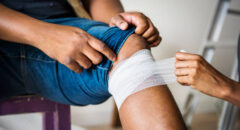
Living with Hidradenitis Suppurativa (HS) can be challenging, but understanding what can make it worse is the first step toward managing this condition effectively. Here are eight things to be mindful of in your daily life that can exacerbate HS symptoms and some friendly tips to help you navigate them.
1. Being Overweight
Extra weight can increase friction and sweat between skinfolds, leading to more irritation and inflammation.
“There are plenty of thin people with the condition, but we do know being overweight is a risk factor,” John Frew, MD, PhD, a clinical scholar in the Laboratory of Investigative Dermatology at The Rockefeller University in New York, tells Everyday Health.
Consider incorporating healthy eating habits and regular physical activity into your routine to help manage your weight and potentially improve your HS symptoms.
RELATED: 8 Ways to Care for Hidradenitis Suppurativa Wounds
2. Sweating
Heat and sweating can aggravate HS, so it’s essential to find ways to stay cool and dry.
“Some people do report that heat and sweating make HS worse, but it is not clear whether it is due to the rubbing of skin together or more complex factors, such as bacteria and acid levels in the skin,” Dr. Frew adds.
Opt for breathable clothing, take frequent breaks during physical activity, and shower promptly after sweating to help minimize its impact on your skin.
3. Tight-Fitting Clothing
Avoid wearing tight clothing that can rub against your skin and trigger HS flare-ups.
Choose loose-fitting, comfortable clothes made from breathable fabrics to reduce friction and chafing.
4. Shaving Affected Areas
Shaving over active HS lesions can irritate the skin and worsen the condition.
Consider alternative hair removal methods like laser hair removal, which can target the






